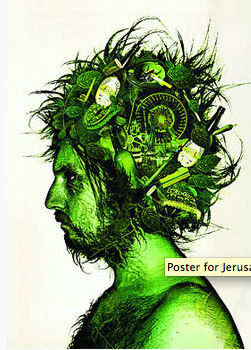Jez Butterworth's Jerusalem
What more can be said about Jez Butterworth's Jerusalem?
The play revolves around the events of St George's Day in a town on the edge of Salisbury Plain. Johnny "Rooster" Byron is a Romany gypsy, and the council have finally arranged the legal essentials to have him evicted to build new housing. Rooster is a Peter-Pan-type character who sells speed to local kids and hosts wild parties; telling tall tales (including an inspired monologue about his conception) and snippets of English legends. On St George's Day, a local fair is held and antics ensue against the background of one of the young "rats" leaving for Australia, the May Queen going missing and Johnny's impending eviction. The story is compelling, fun and troubling.
I first saw this play 2 years ago during its first run at the Royal Court Theatre. Back then, it was the best play I had ever seen. Two years later, I went to watch it with my favourite arts companion at the Apollo Theatre, and in that time, the play had transferred to the West End, had a run on Broadway in New York, and now returned to the West End. Unlike in film, it's a rare opportunity to watch a play you love more than once - the cast changes; a new director puts a completely different twist on it; no-one produces it again - so it was wonderful to have the chance to see it again, by the same company, with the same actors. But, would it live up to the expectations of my memory?
I settled in nervously, worried that my memory of the "best play I'd ever seen" would be undone: it's still winning 5* reviews, so the critics like i, but would I? Nearly all of the cast have stayed on including, most importantly, Mark Rylance as Rooster Byron. So much has been written about this performance that it's hard to say anything new: a chaotic performance, that throws the audience from humour to contempt, solidarity to pity.
I feel lucky to have seen acting of such intensity - subtle, funny outrageous, ambiguous, mercurial and completely enveloping.
I'll be honest - I didn't understand Jerusalem's "message" if there was one: Byron is an anti-hero, clinging to his lost youth; he is an absent father, a drunk, and sells drugs to minors. What is his relationship to the missing girl? What's in his eye? But all that seems to be fairly irrelevant. The play need not have a message - it's just an entertaining romp, with poignant moments, and an ambiguity. Themes are explored: fatherhood, responsibility, friendship, loyalty, abuse; but, it doesn't need to have a pleasant resolution - after all, real-life doesn't. Myth and legend are blurred in Rooster's story-telling as an "indigenous force of nature": does he believe in giants and fairies; is he magic; how was he conceived; what happened with those Nigerian traffic wardens? Bits and pieces of William Blakes's eponymous poem, from which the title is derived, are alluded to throughout the play, adding to the sense of age and legend. The play is an exploration of belonging and Englishness - the theme of modern Englishness captured me - soul-less housing estates, disenfranchised youths, bureaucratic council officers - What Is England?
Byron's character taps into a sense of mystery and longing for something more interesting than the meaningless of existence that simmers beneath the surface of modern life; it taps into the hunger for mythos rather than the logos that society tells us should be the only concern.
You are never quite sure where you stand with Byron, although I think that in the time since the Royal Court that ambiguity has lessened and he is a more positive character. Perhaps the play has lost a little of its rawness since I first saw it (after-all, they have performed it quite a few times), or maybe it's just that I knew the story already. But the key moments have lost none of their intensity, such as Byron's meetings with Dawn, his son, Marky and Troy. The final meeting is set perfectly against a Sandy Jenny song that adds a tone of poignancy and a sense of the mythical world in which Byron lives. [youtube=http://www.youtube.com/watch?v=FzDC4284SA0]
Jerusalem is now completely sold out. If you can get a ticket, by hook or by crook, then you have to go. Rylance as Byron is one of the theatrical events of our generation, that will be remembered alongside McKellan as Lear or Olivier as MacBeth, and this play is only as good as him. As the play's writer, Jez Butterworth said, “As far as I’m concerned you might as well burn this script after we’ve finished with it because I don’t see how anyone else could do it as well as he does. You need to feel the charisma of a genuine eccentric, someone who gives you goose-pimples when they walk on. Mark Rylance just has all that, naturally. What he brings with him is a real fire – heat and light together. When he’s on stage, you get proper illumination.”
I don't know how you'll get to see Jerusalem - but I'm smugly enjoying the fact that I did!

